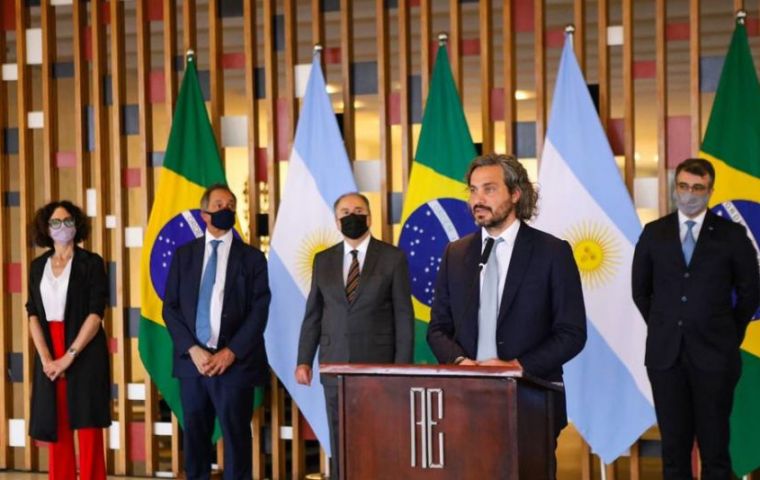MercoPress. South Atlantic News Agency
Agreement reached between Argentina, Brazil to cut down common external tariffs by 10%
 Cafiero's trip to Brasilia meant significant progress in multinational ties
Cafiero's trip to Brasilia meant significant progress in multinational ties The Governments of Argentina and Brazil Friday agreed to cut down the common external tariffs (CET) by 10% “in a very wide universe of products” after months of tensions among members of Mercosur on the issue.
The announcement was made after a meeting in Brasilia between Foreign Ministers Santiago Cafiero and Carlos França.
“We reached an agreement on the common eternal tariff of Mercosur, which will now be taken to the partners, Paraguay and Uruguay, which will allow a 10% decrease in a very wide universe of products,” announced Brazil's França after the meeting.
It was Cafiero's first trip abroad since taking office as Argentina's top diplomat.
França also admitted his country's interest in buying Argentine gas from Neuquén's Vaca Muerta. “For Brazil, Argentina is an absolute priority,” the Foreign Ministry of President Jair Bolsonaro's administration said in a statement, which also addressed the issue of a possible pipeline that would sustain future growth for a country presently going through its worst energy crisis in the past 91 years and is heavily dependant on gas from Bolivia. To make matters worse, in 2022 the Bolsonaro administration will meed to renegotiate supplies from the Itaipú binational power plant with Paraguay.
“Argentina has great production of the gas that Brazil needs in Vaca Muerta. We are working hard to increase connectivity of the input not only in energy as a raw material for fertilizers,” said the Brazilian Foreign Minister, who described the new paths opened as “a 4.0 gas agreement” with Argentina when compared to the commitment that Brazil has had with Bolivia for two decades.
Bolsonaro had said Thursday that Brazilian agribusiness may suffer in 2022 due to a lack of fertilizers in the global market. The foreign minister said that the consensus reached with Cafiero on Mercosur preserves “the sense of union” but also the “adaptation of the bloc to the world.”
“The Ministers reached the necessary consensus to define together with the other MERCOSUR partners the scope and characteristics of the revision of the Common External Tariff. They highlighted that it is an important step towards increasing the competitiveness of the States Parties and towards strengthening regional production processes, which promote a beneficial insertion of MERCOSUR production in global value chains,” a post-meeting joint statement specified.
“In this sense, they agreed to work with Paraguay and Uruguay for the prompt approval of a Decision of the Common Market Council that allows the aliquots of most of the tariff universe to be reduced by 10%, safeguarding the exceptions that already exist within the bloc. They stressed that the understanding reached considers the different needs of the member countries, demonstrating the ability of MERCOSUR to move forward with a constructive vocation towards updating and adapting its tariff structure to the current conditions of regional and world trade in a balanced way regarding the productive capacities of the bloc,” it goes on.
Cafiero defended Argentina's stance on the issue of CET and insisted his country wanted to protect “the exceptions of intensive work in sectors such as automotive, textile and footwear” and emphasized “the importance of the tool of exceptions to protect national labour and Argentine employment.” He also spoke of addressing a future strategic agenda that will encompass energy integration, the creation of a business forum, and cooperation on biotechnology and health issues.
The Argentine delegation also included the Minister of Productive Development Matías Kulfas; Secretary for International Economic Relations Cecilia Todesca Bocco; the Secretary of Industry, Knowledge-Economy and External Commercial Management, Ariel Schale; and the undersecretary of MERCOSUR and International Negotiations, Rossana Cecilia Surballe, as well as Argentine Ambassador to Brazil Daniel Scioli.
Cafiero and França also spoke about the water crisis affecting the Paraná Basin and valued the cooperation between both countries to mitigate its effects on navigation, on the use of water for human consumption, hydroelectric generation and the environment.
In addition, they expressed their satisfaction with the cooperation in the energy area, which includes exports of thermoelectricity from Argentina. They also agreed to a next meeting of the Mixed Technical Commission in charge of the Garabí binational hydroelectric project, in the shared section of the Uruguay River.




Top Comments
Disclaimer & comment rulesCommenting for this story is now closed.
If you have a Facebook account, become a fan and comment on our Facebook Page!